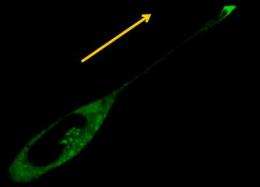A new study in the Journal of Cell Biology reveals how a lipid-converting enzyme helps cancer cells gain traction and mobilize. In this image, Rab-coupling protein (green) gathers at the tip of the pseudopod of an invasive tumor cell. Credit: Elena Rainero
Metastasizing cancer cells often express integrins that provide better traction. A new study in The Journal of Cell Biology reveals how a lipid-converting enzyme helps the cells mobilize these integrins.
Adhesive integrin proteins continually cycle to and from the cell surface. Invasive cancer cells that carry mutant forms of the tumor suppressor p53 often bias the process, increasing the recycling of a particular integrin that offers a better grip on the fibronectin fibers found in tumors. To make this change, mutant p53 requires the Rab-coupling protein (RCP), which connects the integrins to the Rab GTPases that promote membrane recycling. In turn, RCP links up with a lipid called phosphatidic acid.
A team of researchers led by Jim Norman found that diacylglycerol kinase alpha (DGK-alpha), an enzyme that makes phosphatidic acid, helps cancer cells to get moving. Tumor cells that were short on DGK-alpha didn't recycle the integrin and didn't penetrate into slabs of extracellular matrix.
In metastasizing tumor cells, vesicles sporting RCP are tethered to the tips of the advancing pseudopods. Few of these vesicles built up if DGK-alpha was absent, however, indicating that vesicle tethering requires phosphatidic acid. The researchers found that the particular tumor cells they studied didn't boost levels of DGK-alpha in order to metastasize. Instead, the team thinks that DGK-alpha permits cancer cells to move following the acquisition of p53 mutations. By manufacturing lipid that binds to RCP, DGK-alpha enables the tumor cells to tether vesicles containing the integrins close to the plasma membrane, where the integrins can readily recycle.
More information: Rainero, E., et al. 2012. J. Cell Biol. doi: 10.1083/jcb.201109112
Provided by Rockefeller University


















